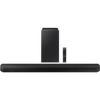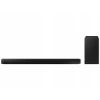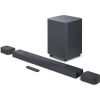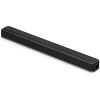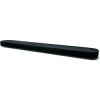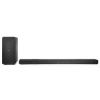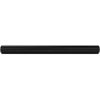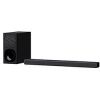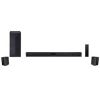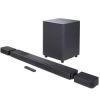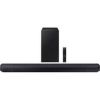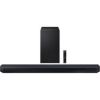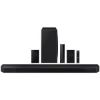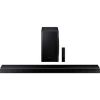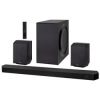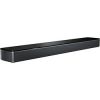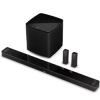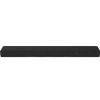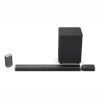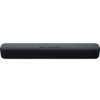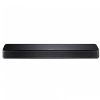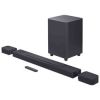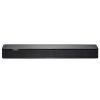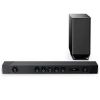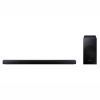ZVOX SB380 vs Bose TV Speaker review
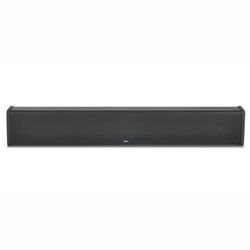
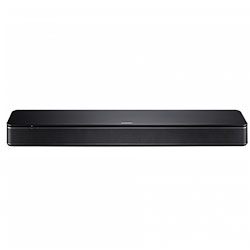
Comparing ZVOX SB380 and Bose TV Speaker, all pros and cons of devices become clear. Advantages have shown that TV Speaker has advantages over SB380 mainly in terms of audio performance. According to the results of our comparison, SB380 received 4 points out of 10 possible, and TV Speaker was rated 5 points.
Advantages ZVOX SB380 over Bose TV Speaker
- ✔Has an integrated subwoofer
Advantages Bose TV Speaker over ZVOX SB380
- ✔Wireless connection and control via Bluetooth
- ✔Supports external media connection via USB
- ✔HDMI ARC supports
Audio features
The SB380 is rated 6 of 10 against 5 for the TV Speaker according to the audio features rating.
It worth understanding the difference between the two types of amplification: a passive soundbar does not have its own amplifier and receives amplification from the signal source, while an active soundbar has a built-in amplifier. The same active type of amplification is used in the SB380 and the TV Speaker.
There are stereo soundbars and multichannel ones. It is with the help of multichannel devices that you can get volumetric sound. It is worth noting one of the main differences, the SB380 has 3.1 channels, while the TV Speaker has 3.0 channels.
| SB380 | TV Speaker | |
|---|---|---|
| Built-in channels | 3.1 | 3.0 |
| Amplification type | active | active |
| Output power, W | 45 | N/A |
| Separate speaker (in package) | 0 | 0 |
| Separate speaker connections | has not | wired |
Subwoofers
Soundbars can have a built-in or external subwoofer. The first type is inseparable from the soundbar body, but for the second, you can choose a good location for deep bass. A built-in subwoofer is only present in the SB380. Both are not equipped with an external subwoofer.
| SB380 | TV Speaker | |
|---|---|---|
| Built-in subwoofer | ✔ | ✖ |
| Separate subwoofer (in package) | ✖ | ✖ |
| Separate subwoofer connections | ✖ | wired |
Multichannel surround
Unlike stereo, when reproducing multichannel sound, each specific direction of sound corresponds to its dedicated channel with a separate independent loudspeaker, which creates a three-dimensional sound stage. The multichannel sound reproduction capabilities of the soundbars were rated 4 out of 10.
The peculiarity of Dolby Atmos is that this format is object-oriented, that is, each object of the audio signal is sounded separately and linked to its spatial location. If we look at the models in terms of Dolby Atmos support, then none of these soundbars can work with this technology.
DTS:X is an algorithm for processing sound scenes by the processor, linking directly to objects, rather than channels, and calculating the optimal distribution of sound output in a room. This ability to reproduce surround sound with DTS:X technology is not implemented in any of the soundbars in this comparison.
| SB380 | TV Speaker | |
|---|---|---|
| Dolby Atmos | ✖ | ✖ |
| Dolby (other) | Dolby Digital | Dolby Digital |
| DTS:X | ✖ | ✖ |
| DTS (other) | has not | has not |
Streaming services
The possibility to listen online to millions of songs from one device has become a reality thanks to streaming services.
None of the two models is not implemented AirPlay function. The popular Spotify service cannot be used on both soundbars.
| SB380 | TV Speaker | |
|---|---|---|
| Apple Music (AirPlay) | ✖ | ✖ |
| Amazon Music | ✖ | ✖ |
| Spotify | ✖ | ✖ |
| Other streaming services | has not | has not |
Connectivity
The existence of a sufficient number of current connectors significantly expands the functionality of the device. For example, only through HDMI is it possible to implement the transfer of object-oriented formats, and the presence of a Bluetooth connection will allow remote control, etc. The devices received different ratings for connectivity: ZVOX SB380 was rated 4 out of 10, and Bose TV Speaker was rated 7 out of 10.
The presence of Wi-Fi in the soundbar allows you to get rid of wires when connected to a sound source and get minimal audio latency when playing content from streaming services. Such connection as via Wi-Fi is not possible on any of the devices in comparison.
Bluetooth connection is now one of the main communication protocols for speaker systems, which provides excellent quality and minimal audio latency. Modern Bluetooth protocol is the privilege of Bose TV Speaker only.
HDMI ARC is a very usefull technology that creates a two-way communication channel between a TV and another device. This is convenient since there is no need to use optical and other cables in the system. HDMI ARC is a feature unique to Bose TV Speaker.
| SB380 | TV Speaker | |
|---|---|---|
| WI-FI | ✖ | ✖ |
| Bluetooth | ✖ | ✔ |
| Ethernet (RJ45) | 0 | 0 |
| NFC | ✖ | ✖ |
| HDMI input/output | 0/0 | 1/0 |
| HDMI ARC | ✖ | ✔ |
| HDMI eARC | ✖ | ✖ |
| HDMI CEC | ✖ | ✔ |
| Optical digital input/output | 2/0 | 1/0 |
| USB | ✖ | 1 (USB 2.0) |
| Coaxial digital input/output | 0/0 | 0/0 |
| Analog audio input/output (RCA) | 1/0 | 1/0 |
| Headphone output | 0 | 0 |
| Subwoofer output | 0 | 1 |
Features
Voice control is designed to make operating the device more convenient. This allows you to control basic soundbar functions from anywhere in the room.
Proprietary applications allow you to control your soundbars remotely. This is possible both via Bluetooth and Wi-Fi. In our case, the ability to control the soundbar using the app is not implemented in any of the competitors. None of these soundbars have a built-in microphone.
Some soundbars can be part of a multi-room system and it is an affordable solution for sounding the whole house. However, it is impossible to create a multiroom system based on each of these soundbars.
| SB380 | TV Speaker | |
|---|---|---|
| Voice control | ✖ | ✖ |
| App control | ✖ | ✖ |
| Microphone | ✖ | ✖ |
| Remote control | ✔ | ✔ |
| Multi-room | ✖ | ✖ |
Dimensions
| SB380 | TV Speaker | |
|---|---|---|
| Size (Wx H x D), cm/in | 88.9 x 12.7 x 7.6/35.5 x 5.7 x 3.3 | 58.4 x 5 x 10.1/23.4 x 2.2 x 4 |
| Weight, kg/pounds | 4/9.8 | 3.1/7.7 |
Popular soundbar comparisons

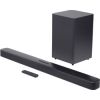
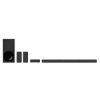
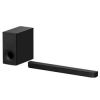
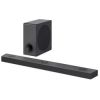
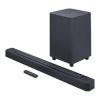
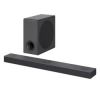
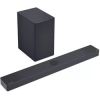
Latest soundbar comparisons

